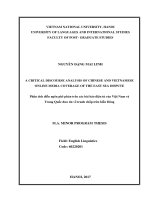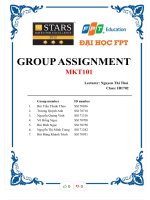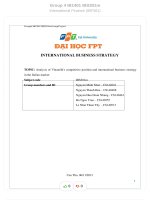Vietnamese real estate market 1
Bạn đang xem bản rút gọn của tài liệu. Xem và tải ngay bản đầy đủ của tài liệu tại đây (47.58 KB, 4 trang )
Porter’s 5 forces: Vietnam’s real estate industry
Student
Institution
Professor
Date
Introduction
The real estate market in Vietnam has been described by analysts as a promising frontier of
investment. The demographic trends such as the expanding middle class have been identified as
key drivers of this positive outlook. This paper will be analyzing the real estate industry in
Vietnam using Porter’s 5 forces 1 at a time. Porter’s 5 forces of competitive advantage is a model
which uses 5 factors identified by Michael Porter, the famous management scholar, to analyze
the structure and thus attractiveness of a given industry (Porter, How competitive forces shape
strategy, 1979). Companies usually use this model to determine their corporate strategy.
1. Competition in the industry
There exists many Vietnamese and multinational players in the real estate industry in
Vietnam. The players in this market are adopting aggressive measures to gain a
competitive edge against each other. These measures include leveraging technology to
facilitate buying homes, selling them, renting them out and experiencing living in
Vietnam. A single industry player is thus weak in this regard
First, the model seeks to find out how many competitors exist in the market and how the
competitive atmosphere is (Porter, 1985). If there is a large number of players in the
market selling similar products or services, then it can be expected that the power of the
company will be less.
2. Potential of new entrants into the industry
Entering the Vietnamese real estate industry requires a lot of capital and expertise white
take time and effort to acquire (Nguyen, 2019). These factors make it difficult for a new
entrant to thrive in the market. When it is easy for a new entrant to begin operations, the
power of the company is less since new entrants may eat up the company’s market share.
A company operating in the Vietnamese real estate industry may therefore be considered
as being powerful in this regard.
3. Power of suppliers
The raw materials used in the real estate industry are numerous (Huy & Nhan, 2020).
These include the varying construction materials all sourced from various suppliers.
Inputs such as cement, wood, tools machinery etc. are all supplied by different parties.
The large number of suppliers results in a low bargaining power for them and higher
power for a real estate company operating in Vietnam. This force examines how powerful
the suppliers of the company are. To determine this, the analyst establishes the number of
suppliers that exist. If there are few suppliers in the market then it can be implied that
suppliers have a lot of power in that market and the company has low power.
4. Bargaining power of customers
Potential real estate customers in Vietnam are many, especially with the ballooning
middle class. Every household is a potential customer. Though there are many real estate
developers in Vietnam, the potential customers greatly outnumber them. This implies that
customers have a low bargaining power to drive the prices in the market. Prices of
property in Vietnam depend on the location with some regions being more expensive than
others.
5. Threat of substitutes
There aren’t many substitutes to real estate. Most people in Vietnam would prefer to
leave in a home as opposed to the streets. This implies that the threat of substitutes in the
Vietnamese real estate market is low. In this regard, a real estate company in Vietnam can
be said to be at an advantage. A real estate company being analyzed would therefore be
regarded to have high power based on this force. This force analyzes how easy it is for
customers to switch up to an alternative product or service that is different from what the
company is offering (Porter, 1985). If customers can easily switch to a substitute, then the
company can be said to have low power. The customers will have more power since the
company will be forced to grant their wishes so as to keep them from shifting to a
substitute.
Conclusion
Porters 5 forces model used herein is a useful tool for determine the competitive market structure
of an industry. The outcome is indicative of how powerful a player is in the market. The threat of
substitutes, bargaining power of customers, power of suppliers and potential of suppliers suggest
that player in the real estate market in Vietnam has power. This implies that Vietnam is an
attractive market for a prospective real estate developer with enough capital and experience.
References
Huy, D. T., & Nhan, V. K. (2020). Impacts of Internal and External Macroeconomic Factors on
Firm Stock Price in an Expansion Econometric model—A Case in Vietnam Real Estate
Industry. Data Science for Finianial Eonometrics, 189-205.
Nguyen, M.-L. (2019). Relationships between Real Estate Markets and Economic Growth in
Vietnam. The Journal of Asian Finance, Economics and Business, 121-128.
Porter, M. (1979). How competitive forces shape strategy. Havard Business Review, 85.
Porter, M. (1985). Competitive Advantage: Creating and Sustaining Superior Performance. New
York: Simon snd Schuster.




